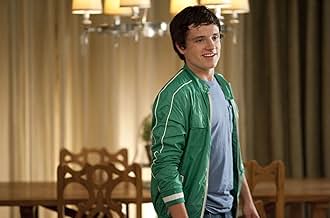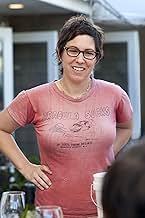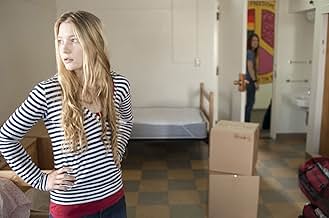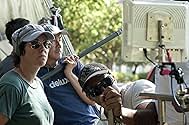NOTE IMDb
7,0/10
136 k
MA NOTE
Deux enfants conçus par insémination artificielle font entrer leur père biologique dans leur vie familiale peu conventionnelle.Deux enfants conçus par insémination artificielle font entrer leur père biologique dans leur vie familiale peu conventionnelle.Deux enfants conçus par insémination artificielle font entrer leur père biologique dans leur vie familiale peu conventionnelle.
- Réalisation
- Scénario
- Casting principal
- Nommé pour 4 Oscars
- 29 victoires et 133 nominations au total
Yaya DaCosta
- Tanya
- (as Yaya Dacosta)
Rebecca Lawrence Levy
- Brooke
- (as Rebecca Lawrence)
James MacDonald
- Clay's Dad
- (as James Macdonald)
Stuart Blumberg
- Sous-chef
- (non crédité)
Diego Calderón
- Waiter
- (non crédité)
Avis à la une
It's unavoidable to compare. We're at the beginning of the world our grandchildren are going to take for granted. But now, we compare and realize that family is by choice or design a place, a state of mind, in which love does or must flourish. Beautifully told with a sensational performance by Annette Bening. Without preaching or candy coating the story we realize that the future has a chance. Two women, one sperm donor and two children. Why not? We see the results on the children's faces. Mia Wasikowska is the daughter. Smart, compassionate, mature beyond her years. Josh Hutcherson is the son and, although he is the least developed character, I loved him, with his lopsided smile and his healthy curiosity. Mark Ruffalo, wonderful, showing us, as the sperm donor, another face of a character he has a monopoly in, the lovable loser. He is terrific! Julianne Moore is still an actress I find very hard to surrender to. Her acting is so much upfront that it takes you out of the truth she's trying to convey. However I loved the film and I only hope Hillary Swank is not nominated next year so Annette Bening finally gets what she so richly deserves.
In Los Angeles, the lesbians Jules (Julianne Moore) and Nicole "Nic" (Annette Bening) are mothers of the eighteen year-old Joni Mitchell (Mia Wasikowska) and fifteen year-old Laser (Josh Hutcherson) that have been conceived by the same sperm donor for the artificial insemination. Nic is a doctor; Jules is a housewife graduated in architecture and has just started a gardening business but she is not supported by Nic and has no clients; Joni has joined the college; and Laser is in high-school. Out of the blue, Joni decides to seek out her biological father and she finds Paul (Mark Ruffalo), who is a businessman with a restaurant and a nontrangenic plantation. After the first encounter, they invite Paul to have dinner with their family and Paul hires Jules to transform his back garden. Paul gets close to Joni and Laser and has a love affair with Jules. He falls in love for her, but Jules still loves Nic. Meanwhile Nic feels that she is losing her authority with the children and is jealous of Paul. How will this triangle of love end?
"The Kids Are All Righta" is an original dramatic comedy (or comic drama) about an unconventional family that is deeply affected when the sperm donor is brought to them. The conclusion is realistic and without any concessions. The eternal beauty of Julianne Moore is another attraction of this little film. My vote is seven.
Title (Brazil): "Minhas Mães e Meu Pai" ("My Mothers and My Father")
"The Kids Are All Righta" is an original dramatic comedy (or comic drama) about an unconventional family that is deeply affected when the sperm donor is brought to them. The conclusion is realistic and without any concessions. The eternal beauty of Julianne Moore is another attraction of this little film. My vote is seven.
Title (Brazil): "Minhas Mães e Meu Pai" ("My Mothers and My Father")
The Kids Are All Right is yet another dramedy about a dysfunctional family, but it is still an excellent film with a great script and performances.
Annette Bening and Julianne Moore are excellent. Both are extremely versatile, and both flawed, but they play their characters with true respect for the script. Mark Ruffalo is also a nice addition, but If I had to choose the best, it would be Bening, simply because she has the most to play with. There is a great scene where she finally warms up to Ruffalo's character and starts her own rendition of one of her favorite songs in the dinner table. The best scene in the film, perfectly executed, and Bening certainly deserves an Oscar nomination for that scene alone. Mia Wasikowska also proves that she is a great talent to behold for the future. The ending is great, really touching and it rings especially with me because I am close to leaving for college next year as well.
Overall, I regret not having seen this sooner, and it is definitely worth accolades for the script and performances.
Annette Bening and Julianne Moore are excellent. Both are extremely versatile, and both flawed, but they play their characters with true respect for the script. Mark Ruffalo is also a nice addition, but If I had to choose the best, it would be Bening, simply because she has the most to play with. There is a great scene where she finally warms up to Ruffalo's character and starts her own rendition of one of her favorite songs in the dinner table. The best scene in the film, perfectly executed, and Bening certainly deserves an Oscar nomination for that scene alone. Mia Wasikowska also proves that she is a great talent to behold for the future. The ending is great, really touching and it rings especially with me because I am close to leaving for college next year as well.
Overall, I regret not having seen this sooner, and it is definitely worth accolades for the script and performances.
The Kids Are All Right is one of those sweetly sentimental comedies that manages to be funny as well. It's about a decidedly unorthodox family that's far from perfect – and what happens when a so-called interloper arrives on the scene. It's wonderfully acted, with affecting performances by Mark Ruffalo and Julianne Moore, and it's engaging entertainment, no small feat when the subject of touching charm arises.
Nic (Annette Bening) and Jules (Moore) are a married lesbian couple in California with two kids, Laser (Josh Hutcherson) and Joni (Mia Washikowska). Two two kids – one for each mom – are the result of a sperm donor, and when Joni turns 18 she places a call to the sperm bank at her brother's behest. The two wind up meeting Paul (Ruffalo) and hit it off, but when the two moms meet him, they have strikingly different reactions to his arrival.
There's excellent conflict afoot here. The kids resent their moms for being so defensive about their wanting to know about their own biological father; the moms resent the kids for looking into the matter themselves. X is the calm, mediating type; she's outwardly caring and splits her time between raising the two kids and starting new (doomed) businesses. By contrast, Nic is more inwardly insecure, and she compensates by controlling as much as possible of the lives of the other three. No wonder Paul's appearance causes Nic to get her back up.
The movie isn't one of those where increasingly wacky situations occur. It's not a slammed-door comedy. People behave as if you'd expect them to behave, which is nice thing to see in a comedy (rather than exaggeration of gestures and speech, for example). Eventually, it isn't enough that Paul shows up in everyone's lives, disrupting what little harmony they have; something else happens as a result of his appearance that really behaves as the key conflict. And for once, when the culprits are confronted, there is no neatly tied response given by the rest of the family.
Another pleasant aspect of the movie is that it never treats the relationship between Bening and Moore as if it were anything but the most commonplace thing on earth. It's not just that these two woman are married and in love, it's that they're also utterly human – they fight each other convincingly, they get their feelings hurt, and they reconcile with the kind of subtlety you rarely really see in movies these days. Each character, rather than being simply caricatures of what a straight person would assume a gay married couple would look like, has her own striking personality, and the two actresses perform quite well. I think Moore comes off a little better and that Bening's character sometimes seemed a little one dimensional – but this is more likely an oversight on the part of the writer, not the actress. Ironically, it was Bening who received an Oscar nomination for this movie, but I think Moore's work was superior here.
Overall, the script neither flashy nor contrived; situations don't crop up just so we can have a laugh at someone's expense. Well done.
The Kids Are All Right is a genuinely funny movie. It's not a gagfest, and it wasn't meant to be one. The characters are sincere but not always forthright; they all seem to make a bad decision or two in the movie. The cast was well selected (lest I forget, Ruffalo is aces as a laid-back buttinsky, if such a thing can exist), and it's a movie worth seeing.
Nic (Annette Bening) and Jules (Moore) are a married lesbian couple in California with two kids, Laser (Josh Hutcherson) and Joni (Mia Washikowska). Two two kids – one for each mom – are the result of a sperm donor, and when Joni turns 18 she places a call to the sperm bank at her brother's behest. The two wind up meeting Paul (Ruffalo) and hit it off, but when the two moms meet him, they have strikingly different reactions to his arrival.
There's excellent conflict afoot here. The kids resent their moms for being so defensive about their wanting to know about their own biological father; the moms resent the kids for looking into the matter themselves. X is the calm, mediating type; she's outwardly caring and splits her time between raising the two kids and starting new (doomed) businesses. By contrast, Nic is more inwardly insecure, and she compensates by controlling as much as possible of the lives of the other three. No wonder Paul's appearance causes Nic to get her back up.
The movie isn't one of those where increasingly wacky situations occur. It's not a slammed-door comedy. People behave as if you'd expect them to behave, which is nice thing to see in a comedy (rather than exaggeration of gestures and speech, for example). Eventually, it isn't enough that Paul shows up in everyone's lives, disrupting what little harmony they have; something else happens as a result of his appearance that really behaves as the key conflict. And for once, when the culprits are confronted, there is no neatly tied response given by the rest of the family.
Another pleasant aspect of the movie is that it never treats the relationship between Bening and Moore as if it were anything but the most commonplace thing on earth. It's not just that these two woman are married and in love, it's that they're also utterly human – they fight each other convincingly, they get their feelings hurt, and they reconcile with the kind of subtlety you rarely really see in movies these days. Each character, rather than being simply caricatures of what a straight person would assume a gay married couple would look like, has her own striking personality, and the two actresses perform quite well. I think Moore comes off a little better and that Bening's character sometimes seemed a little one dimensional – but this is more likely an oversight on the part of the writer, not the actress. Ironically, it was Bening who received an Oscar nomination for this movie, but I think Moore's work was superior here.
Overall, the script neither flashy nor contrived; situations don't crop up just so we can have a laugh at someone's expense. Well done.
The Kids Are All Right is a genuinely funny movie. It's not a gagfest, and it wasn't meant to be one. The characters are sincere but not always forthright; they all seem to make a bad decision or two in the movie. The cast was well selected (lest I forget, Ruffalo is aces as a laid-back buttinsky, if such a thing can exist), and it's a movie worth seeing.
The nuclear family takes on a different spin when both parents are same sex and the kids are the product of a male sperm donor in The Kids Are All Right. When traumatic upheaval and revelations strike such a family, the results can be amusing and also tragic. Annette Bening and Julianne Moore highlight an insightful script about domesticity turned on its head.
Nic (Bening) and Jules (Moore) are lesbian parents of two teens, Joni and Laser. One day the children research and contact their biological father, Paul (Mark Ruffalo), who agrees to meet his progeny. After an awkward first meeting, things actually go well as the new family connections are explored by the kids and their newly found father. The couple of Nic and Jules are a contrast; Nic is the physician who is totally controlling while Jules is still trying to find herself with a new business of landscaping. Laser hangs with the wrong crowd and begins to realize that he deserves better through his bond with Paul. Joni is trying to assert herself as an adult and prepares to go to college. The moms show a parental responsibility to watch over their children and want to meet the dad. When Paul hires Jules to do work on his restaurant landscape, the two connect. As Paul's influence begins to overcome the family, Nic feels left out. But there is an attraction between Jules and Paul that leads to a torrid affair, and when Nic discovers the truth, the family is torn apart. Into this mix are two maturing children whose emotions will be tested throughout.
The roles are well acted especially by Benning as a betrayed spouse, and in particular, her scene of revelation about Jules is a marvel of expressiveness and devastating heartbreak. This culminates in a powerful moment with all the principals present at Paul's dinner table. Moore gives solid support and shines in her heartfelt plea to her family near the end. The ensemble is well cast particularly Ruffalo whose almost bystander role is suddenly elevated to catalyst and disruptor of the family's dynamic.
The story has a nice balance of serious tones and comedic elements born out of the situations. The themes work on several levels like ingredients of a zesty recipe: the family chemistry, the couple of Nic and Jules, the kids' developing bond with Paul, Paul and Jules, and shake and mix well. Everyone has needs and wants, and the strongest is a need to belong to a family and the need to connect with another human being whether it be Laser and his friends, Paul and Jules, Paul and his children, and Nic and Jules. Amid the conflicts, no one escapes unscathed. There are no real heroes or villains here, only hard truths about life and relationships.
The fact that two lesbians are having the conflict over infidelity may seem novel on the surface, but it could easily have been a heterosexual couple. In fact the notion of two lesbians virtually disappears as we witness and understand this family unit with its warts and all. It could be any family when you think about it. The fact that both Benning and Moore play their respective spousal roles so convincingly is a testament to their acting skills playing off an excellent script by Stuart Blumberg and Lisa Cholodenko, who also directs. The ending rings true and shows not only how far the relationships have come, but how that foundation, despite some serious challenges, is strong enough to survive. Life moves on, and there is hope for the future.
There are not a lot of loose ends in this story although, toward the end, it would be nice to get a bit more resolution to Ruffalo's character. The film does contains a couple of brief explicit sex scenes without which this would essentially be a PG rated film. There is little to quibble about, and the viewer gets to experience one of the more insightful domestic dramas in recent years.
Nic (Bening) and Jules (Moore) are lesbian parents of two teens, Joni and Laser. One day the children research and contact their biological father, Paul (Mark Ruffalo), who agrees to meet his progeny. After an awkward first meeting, things actually go well as the new family connections are explored by the kids and their newly found father. The couple of Nic and Jules are a contrast; Nic is the physician who is totally controlling while Jules is still trying to find herself with a new business of landscaping. Laser hangs with the wrong crowd and begins to realize that he deserves better through his bond with Paul. Joni is trying to assert herself as an adult and prepares to go to college. The moms show a parental responsibility to watch over their children and want to meet the dad. When Paul hires Jules to do work on his restaurant landscape, the two connect. As Paul's influence begins to overcome the family, Nic feels left out. But there is an attraction between Jules and Paul that leads to a torrid affair, and when Nic discovers the truth, the family is torn apart. Into this mix are two maturing children whose emotions will be tested throughout.
The roles are well acted especially by Benning as a betrayed spouse, and in particular, her scene of revelation about Jules is a marvel of expressiveness and devastating heartbreak. This culminates in a powerful moment with all the principals present at Paul's dinner table. Moore gives solid support and shines in her heartfelt plea to her family near the end. The ensemble is well cast particularly Ruffalo whose almost bystander role is suddenly elevated to catalyst and disruptor of the family's dynamic.
The story has a nice balance of serious tones and comedic elements born out of the situations. The themes work on several levels like ingredients of a zesty recipe: the family chemistry, the couple of Nic and Jules, the kids' developing bond with Paul, Paul and Jules, and shake and mix well. Everyone has needs and wants, and the strongest is a need to belong to a family and the need to connect with another human being whether it be Laser and his friends, Paul and Jules, Paul and his children, and Nic and Jules. Amid the conflicts, no one escapes unscathed. There are no real heroes or villains here, only hard truths about life and relationships.
The fact that two lesbians are having the conflict over infidelity may seem novel on the surface, but it could easily have been a heterosexual couple. In fact the notion of two lesbians virtually disappears as we witness and understand this family unit with its warts and all. It could be any family when you think about it. The fact that both Benning and Moore play their respective spousal roles so convincingly is a testament to their acting skills playing off an excellent script by Stuart Blumberg and Lisa Cholodenko, who also directs. The ending rings true and shows not only how far the relationships have come, but how that foundation, despite some serious challenges, is strong enough to survive. Life moves on, and there is hope for the future.
There are not a lot of loose ends in this story although, toward the end, it would be nice to get a bit more resolution to Ruffalo's character. The film does contains a couple of brief explicit sex scenes without which this would essentially be a PG rated film. There is little to quibble about, and the viewer gets to experience one of the more insightful domestic dramas in recent years.
Le saviez-vous
- AnecdotesMark Ruffalo filmed his role in only six days.
- GaffesLaser tells Paul that Joni got the National Merit Scholarship for science; however, National Merit Scholarships are not awarded in any specific categories. Candidates are chosen because of high scores on the PSAT, which does not include a science section.
- Bandes originalesCousins
Written by Ezra Koenig, Rostam Batmanglij, Chris Baio, and Chris Tomson
Performed by Vampire Weekend
Courtesy of XL Recordings Ltd
By arrangement with The Beggars Group
Meilleurs choix
Connectez-vous pour évaluer et suivre la liste de favoris afin de recevoir des recommandations personnalisées
- How long is The Kids Are All Right?Alimenté par Alexa
Détails
- Date de sortie
- Pays d’origine
- Site officiel
- Langue
- Aussi connu sous le nom de
- Los niños están bien
- Lieux de tournage
- Sociétés de production
- Voir plus de crédits d'entreprise sur IMDbPro
Box-office
- Budget
- 4 000 000 $US (estimé)
- Montant brut aux États-Unis et au Canada
- 20 811 365 $US
- Week-end de sortie aux États-Unis et au Canada
- 491 971 $US
- 11 juil. 2010
- Montant brut mondial
- 34 758 951 $US
- Durée
- 1h 46min(106 min)
- Couleur
- Mixage
- Rapport de forme
- 1.85 : 1
Contribuer à cette page
Suggérer une modification ou ajouter du contenu manquant






























